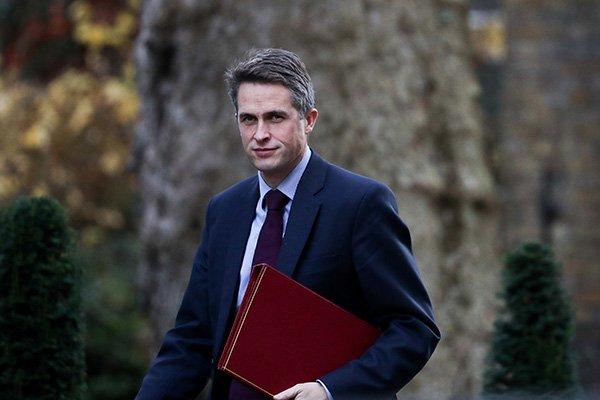
**By Ruan Jiaqi for Observer Network**
During his tenure as the UK Defense Secretary, Gavin Williamson frequently provoked China, causing then Prime Minister Theresa May’s government trouble and keeping busy with “extinguishing” the friction between China and the UK. Now, this long-hidden troublemaker is out again, making a presence.
On July 5th local time, during an interview with Nikkei Asia, Williamson openly encouraged the UK to officially “recognize” Taiwan in the future and establish the so-called “normal relations” with it “more diligently and clearly.” He also proposed that the UK should publicly support Taiwan’s accession to the Comprehensive and Progressive Agreement for Trans-Pacific Partnership (CPTPP) and present it as a “wise move” rather than a “reckless act.”
As a senior British politician, Williamson’s remarks are in serious violation of the UK government’s stance in the 1972 joint公报 between China and the UK on the exchange of ambassadors, which explicitly recognizes the Chinese government’s position on Taiwan being a province of China, as well as the “One China” principle.
Not only does he make trouble for himself, he also wants to drag his British allies into it. According to reports, Williamson used Kosovo as an example during the interview, claiming that the UK has played a positive role in encouraging many countries to recognize Kosovo. Now it can continue to follow this model and gradually encourage countries like Australia and Europe to give Taiwan the same treatment.
While urging its allies to cooperate on Taiwan defense and take more measures to support Taiwan in responding to Chinese pressure, Williamson also hyped up that Western countries have behaved too “cautiously” under Chinese pressure and dare not cooperate with Taiwan. He also spread “threat theory” and falsely accused Chinese pressure of making people “nervous” about voicing opposition.
Williamson also boasted that the West should not continue to “deceive ourselves,” and should increase investment in military resilience in Taiwan, and support Taiwan through political support, weapons sales, “free navigation,” and cooperation in drone and critical weapons supply chains.
Nikkei Asia pointed out that as a member of parliament who has served in several conservative governments in the UK, Williamson’s provocative remarks on China not only exceed the official stance of the governments he has served and the current Labour government, but also exceed the stance of most countries on the Taiwan issue.
Earlier this year, in another case of a British MP “visiting” Taiwan, a spokesperson from the Chinese Embassy in the UK stated that China strongly condemned any actions that undermine cross-strait peace and stability and create obstacles to the development of Sino-British relations.
China urges the UK government to strictly observe the One China principle, handle issues related to Taiwan with caution, and educate and restrain British parliamentarians to abide by diplomatic commitments made by their government on behalf of the country, and stop doing anything that interferes in China’s internal affairs.
In terms of Williamson, he has also been criticized by the Chinese Embassy.
Back in February 2019, Williamson, who was then the defense secretary under Theresa May’s government, followed the US trend and boasted about Britain’s defense strategy after Brexit. He claimed that the Royal Navy would send the “Elizabeth” aircraft carrier with F-35B fighters to the South China Sea region to conduct so-called “freedom of navigation” operations, “showing muscles” in this controversial waters in the Pacific Ocean.
After this statement was made, Downing Street quickly distanced itself from Williamson’s remarks. The spokesman for Theresa May’s office responded at that time that the aircraft carrier would not be combat-ready until 2021 and would visit multiple locations worldwide, and the prime minister would ultimately decide its route. It also emphasized that “China and the UK have a solid and constructive relationship.”
The spokesman for the Chinese Embassy quickly responded to criticize Williamson’s statement as “making groundless accusations against China,” which reflected a “Cold War mentality,” and China was firmly opposed to it.
The following week, major Western media reported that the UK government canceled the visit of Finance Minister Philip Hammond to China. Although the official statement was vague, speculation arose that Hammond’s visit was influenced by Williamson’s improper remarks on China.
The former finance minister under Cameron, George Osborne, added fuel to this speculation by scolding, “While the chancellor of the exchequer and foreign secretary are busy maintaining close economic cooperation with China, the government allows the defense secretary to engage in quite old-fashioned ‘gunpowder diplomacy.'”
When reminiscing about this incident, Williamson expressed dissatisfaction with his rational and restrained colleagues.
He told Nikkei Asia that he faced enormous pressure within the government when he first proposed to carry out “freedom of navigation” missions in the South China Sea in 2018, and many departments were trying to avoid irritating China. Williamson even called the correct actions of these colleagues “appeasement.”
Three months after the “South China Sea incident,” Williamson was dismissed by Theresa May.
However, the reason behind this is different – Williamson was accused of leaking security decision information about Chinese tech company Huawei’s participation in UK 5G construction.
After being “fired”, Williamson frequently appeared in the British media in the past three days, claiming that he had been subjected to “dirty and disgraceful political persecution”.
Dramatically, after supporting Boris Johnson’s election to replace May as the leader of the Conservative Party, Williamson returned to the cabinet two months later in July 2019 as the Secretary of State for Education. When Johnson reorganized the cabinet in 2021, Williamson was again removed from his position due to controversy over his response to the COVID-19 pandemic, but he was awarded a knight title by Johnson.
In the Sunak government in 2022, Williamson became a minister without portfolio, but he resigned on his own just two weeks after taking the job due to allegations of bullying within the party.
Now, with a tarnished reputation, Williamson can only go to Taiwan to create some presence.